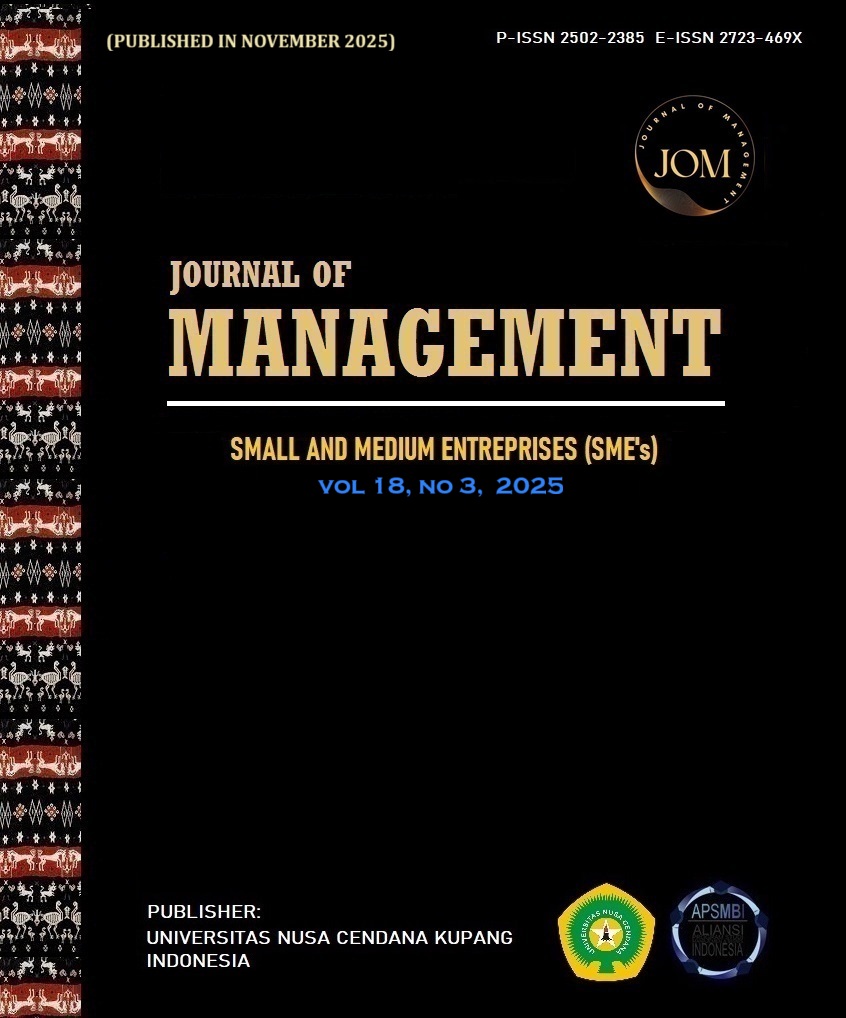THE MODERATING ROLE OF ORGANIZATIONAL SUPPORT ON THE RELATIONSHIP OF PROBLEM SOLVING AND TASK COMPLEXITY TO WORK ENGAGEMENT
Abstract
This study explores the moderating role of organizational support in the relationship between problem-solving ability, task complexity, and employee work engagement. The dynamics of the contemporary work environment demand an in-depth understanding of the factors that influence work engagement as a central construct in human resource management. Using a quantitative approach with a cross-sectional survey design, this study analyzed data through variance-based structural equation modeling to test the formulated moderation hypotheses. The findings show that problem-solving ability and task complexity positively influence work engagement. Organizational support was shown to moderate the relationship significantly between problem-solving ability and work engagement, but the moderating effect on task complexity was not significant. The theoretical contribution of the study lies in validating the moderating mechanism of organizational support in optimizing individual competencies to increase work engagement. Practical implications indicate the importance of developing an integrated organizational support system that includes instrumental and emotional dimensions to facilitate the transformation of employees' analytical abilities into active engagement in an increasingly complex work environment.
Keywords: Work Engagement; Organizational Support; Problem Solving Ability
Downloads
References
Chen, L., Li, X., & Xing, L. (2022). From mindfulness to work engagement: The mediating roles of work meaningfulness, emotion regulation, and job competence. Frontiers in Psychology, 13. https://doi.org/10.3389/fpsyg.2022.997638
Cheng, X., Bao, Y., Zarifis, A., Gong, W., & Mou, J. (2022). Exploring consumers' responses to text-based chatbots in e-commerce: the moderating role of task complexity and chatbot disclosure. Internet Research, 32(2), 496-517. https://doi.org/10.1108/INTR-08-2020-0460
Gemeda, H. K., & Lee, J. (2020). Leadership styles, work engagement and outcomes among information and communications technology professionals: A cross-national study. Heliyon, 6(4). https://doi.org/10.1016/j.heliyon.2020.e03699
Islam, M. F., Al Masud, A., Emon, Md., Shuvro, R. A., Jony, M. T. I., & Akter, T. (2025). Integrating green HRM for productivity and sustainability: green innovation, engagement and pro-environmental behavior as key mediators. Future Business Journal, 11(1), 24. https://doi.org/10.1186/s43093-025-00433-w
Lai, F. Y., Tang, H. C., Lu, S. C., Lee, Y. C., & Lin, C. C. (2020). Transformational Leadership and Job Performance: The Mediating Role of Work Engagement. SAGE Open, 10(1). https://doi.org/10.1177/2158244019899085
Ma, L., Ma, H., Zhan, X., & Wang, Y. (2023). How Do Problem-Solving Demands Influence Employees' Thriving at Work: An Explanation Based on Cognitive Appraisal. Sustainability, 15(20), 14879.
https://doi.org/10.3390/su152014879
Maan, A. T., Abid, G., Butt, T. H., Ashfaq, F., & Ahmed, S. (2020). Perceived organizational support and job satisfaction: a moderated mediation model of proactive personality and psychological empowerment. Future Business Journal, 6(1), 1-10. https://doi.org/10.1186/s43093-020-00027-8
Mansyur, A., Suhana, S., Husein, A., Ekonomika, F., Bisnis, D., & Stikubank, U. (n.d.). Investigating the Role of Subjective Task Complexity and Absorbing Capacity on Knowledge Sharing Behavior.
Mazzetti, G., Robledo, E., Vignoli, M., Topa, G., Guglielmi, D., & Schaufeli, W. B. (2023). Work Engagement: A meta-Analysis Using the Job Demands-Resources Model. In Psychological Reports (Vol. 126, Issue 3, pp. 1069-1107). SAGE Publications Inc. https://doi.org/10.1177/00332941211051988
Monje-Amor, A., Abeal Vázquez, J. P., & Faíña, J. A. (2020). Transformational leadership and work engagement: Exploring the mediating role of structural empowerment. European Management Journal, 38(1), 169-178.
https://doi.org/10.1016/j.emj.2019.06.007
Ojo, A. O., Fawehinmi, O., & Yusliza, M. Y. (2021). Examining the predictors of resilience and work engagement during the covid-19 pandemic. Sustainability (Switzerland), 13(5). https://doi.org/10.3390/su13052902
Park, Y., Lim, D. H., Kim, W., & Kang, H. (2020). Organizational support and adaptive performance: The revolving structural relationships between job crafting, work engagement, and adaptive performance. Sustainability (Switzerland), 12(12). https://doi.org/10.3390/SU12124872
Purnomo & Pranitasari, D. (2024). The Role of Work Engagement in Mediating Organizational Culture and Self-Efficacy on Commitment at PT Perusahaan Listrik Negara. In Ecoment Global Journal (Vol. 9, Issue 2).
Rasool, S. F., Wang, M., Tang, M., Saeed, A., & Iqbal, J. (2021). How toxic workplace environment affects the employee engagement: The mediating role of organizational support and employee wellbeing. International Journal of Environmental Research and Public Health, 18(5), 1-17.
https://doi.org/10.3390/ijerph18052294
Rockstuhl, T., Eisenberger, R., Shore, L. M., Kurtessis, J. N., Ford, M. T., Buffardi, L. C., & Mesdaghinia, S. (2020). Perceived organizational support (POS) across 54 nations: A cross-cultural meta-analysis of POS effects. Journal of International Business Studies, 51(6), 933-962. https://doi.org/10.1057/s41267-020-00311-3
Shute, V. J., & Emihovich, B. (2018). Assessing Problem-Solving Skills in Game-Based Immersive Environments (pp. 635-648). https://doi.org/10.1007/978-3-319-71054-9_40
Sulistiyani, E., Hidayat, Y. A., Setiawan, A., & Suwardi, S. (2022). Perceived organizational support, employee work engagement and work life balance: Social exchange theory perspective. Journal of Economic and Business Research, 15(2), 133. https://doi.org/10.26623/jreb.v15i2.5336
Weiner, B. J. (2009). A theory of organizational readiness for change. Implementation Science, 4(1). https://doi.org/10.1186/1748-5908-4-67
Wood, J., Oh, J., Park, J., & Kim, W. (2020a). The Relationship Between Work Engagement and Work-Life Balance in Organizations: A Review of the Empirical Research. Human Resource Development Review, 19(3), 240-262.
https://doi.org/10.1177/1534484320917560
Xu, Y., Shieh, C. H., van Esch, P., & Ling, I. L. (2020a). AI customer service: Task complexity, problem-solving ability, and usage intention. Australasian Marketing Journal, 28(4), 189-199. https://doi.org/10.1016/j.ausmj.2020.03.005
Yehuda, M., Manuel, A., & Imanuel, F. (2024). The Effect of Job Pressure and Task Complexity on Performance with Resilience Ability as Moderator (Vol. 22, Issue 3). https://jurnal.ubd.ac.id/index.php/ds
Zeitlhofer, I., Zumbach, J., & Schweppe, J. (2024b). Complexity affects performance, cognitive load, and awareness. Learning and Instruction, 94. https://doi.org/10.1016/j.learninstruc.2024.10200

 Gabriel Angela Purba(1*)
Gabriel Angela Purba(1*)



